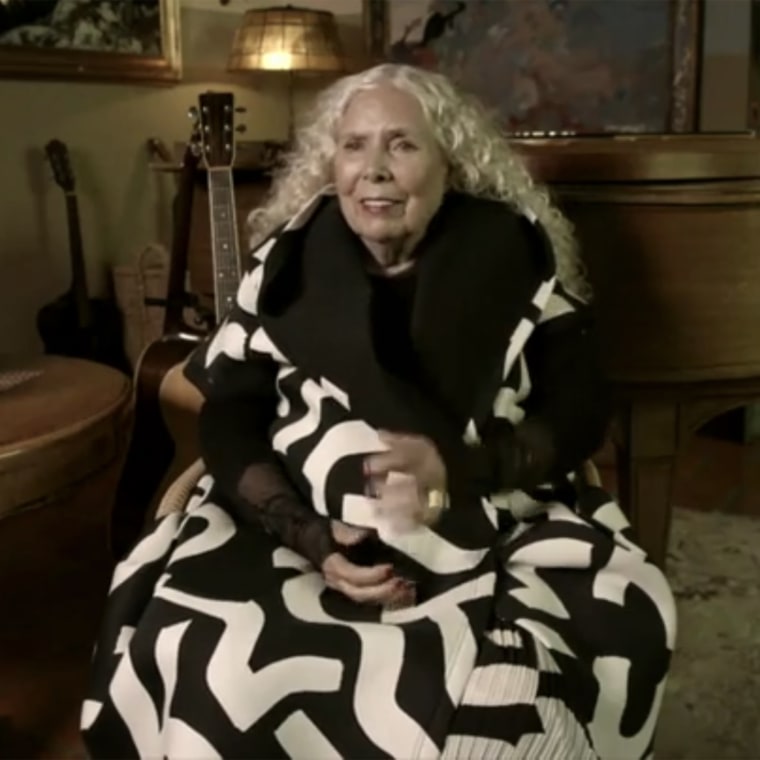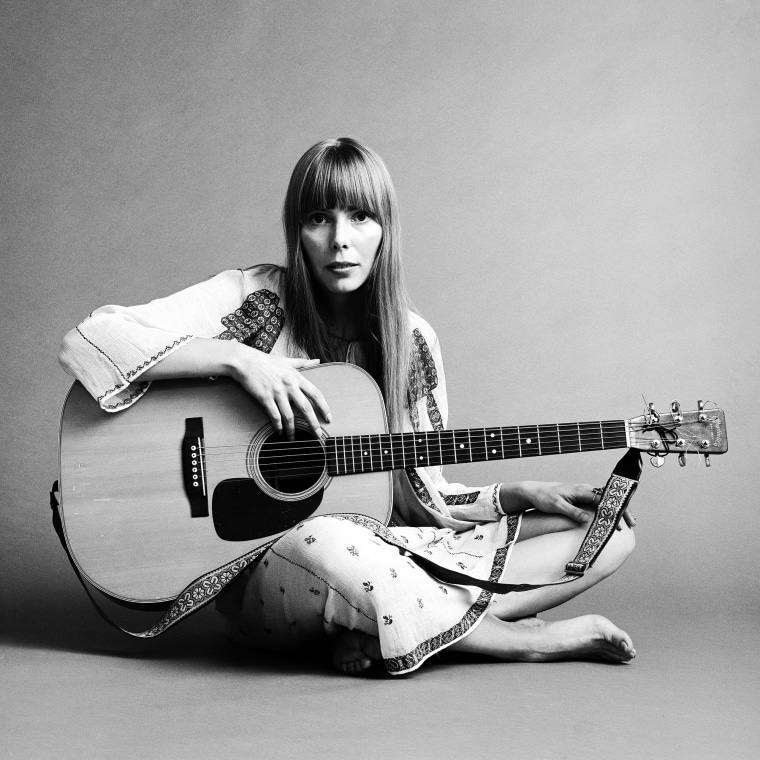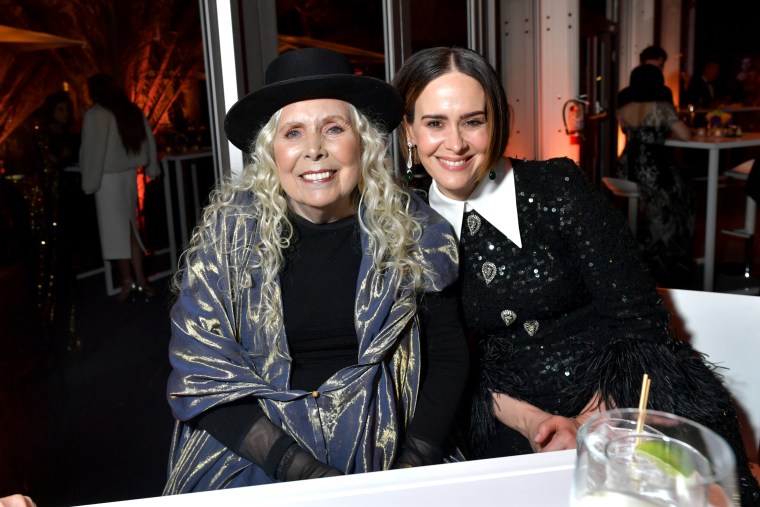Clive Davis has a gig as music's own new Barbara Walters, if he wants it. For the second half of his two-part virtual "Grammy gala" this year, the music mogul doubled down in Saturday night's invitation-only webcast on interviews with the stars, including Elton John, DaBaby, Paul Simon, H.E.R., Dave Grohl, Dionne Warwick and Chris Stapleton. When awards season returns in a presumably post-pandemic 2022, Davis will probably return to the usual performance-based Beverly Hills parties to which guests have become accustomed, but at least a few will miss his 2021 talk-show format.
Even Walters might have been jealous of Davis' big "get" of Saturday's marathon six-hour session, Joni Mitchell, who had not given any interviews in a public or even semi-public setting since suffering an aneurysm in 2015. Mitchell, 77, has been known to be a loquacious party host and guest in the last few years, and gave Cameron Crowe a print interview for a boxed set's liner notes that was excerpted in the Guardian last fall. But for any of Davis' hundreds of guests who hadn't heard that Mitchell was in perfectly chatty shape, her 14 minutes with Davis (edited down from an approximately 40-minute conversation they pre-recorded) may have come as a happy revelation, and even those who've had the chance to speak with her in private recently welcomed the opportunity to hear her reminisce about her early influences and revolutionary career.
Also on the docket was Oprah Winfrey, who was ostensibly on hand to pay tribute to Tina Turner -- following Davis playing a vintage performance clip of the newly named Rock & Roll Hall of Fame member singing "Simply the Best" -- but who also shared a memorable story about Davis' beloved Whitney Houston and how she got a TV taping audience to keep a possibly shameful Houston secret.
Appearing early on in a webcast seen by a couple of thousand viewers on Zoom and Moment House platforms (many of whom had ponied up donations for the event's beneficiaries, the Recording Academy's MusiCares and Grammy Museum), Mitchell seemed at ease as Davis asked her about everything from the origin of "Both Sides Now" to the parties she's recently been famous for throwing in the Santa Barbara area, which outdo Davis' soirees for inducing jealousy among the outside world.

As Davis asked Mitchell more than once how it feels to be so popularly admired and cited as an influence -- mentioning that, every time she's been a guest at one of his pre-Grammy galas, she got more sustained applause than any of the contemporary performers -- Mitchell drifted back more toward the resistance she says she encountered, from her first days in a coffeehouse through mixed reviews her albums got in the 1980s.
"Well, you know, when I first started writing less from fantasy," Mitchell said, "when I started scraping my own soul more and getting more humanity in it, it scared the singer-songwriters around me. The men seemed be nervous about it, almost like Dylan plugging in and going electric. Like, 'Does this mean we have to do this now?'" she laughed. "But over time, I think it did make an influence. I think it encouraged people to write more from their own experience. I mean, literature is very personal. People write from experience and that's what makes it rich. But people used to say to me, 'Nobody's ever going to cover your songs. They're too personal.' And yet that's not true. They're getting a lot of covers. So that's really encouraging to me, because I thought, 'I don't see why these men are so upset about it... It's just humanness that I'm trying to describe.'"
Mitchell claimed to have not been overly conscious of the extent of her influence until recent years -- distracted more, she suggested, by brickbats that came her way at certain points in her career. "It was only recently that people have come forward and told me," she said. "I was unaware, because all I was aware of was bad reviews, which I thought were unjust and stupid. Especially 'Dog Eat Dog' (in 1985) got terrible reviews. Except in the Black magazines. I thought, why is it that people are so hard on this stuff? Well, I guess it's because it's different. It didn't fit into a genre of folk music or jazz" but was "somewhere in between... I always that folk music wasn't a good title for me, except it was a girl with a guitar, and therefore a folk singer, right? The only people that could play my music were jazz musicians, because it was so strange. And they could write it out and look at the strangeness and get in on it."
Mitchell is not performing anymore, but Brandi Carlile filmed a stunning solo piano rendition of "A Case of You" for Davis' webcast. She'd taken it upon herself to perform "Blue" in its entirety in a Mitchell-attended Walt Disney Hall show two years ago that was arguably the most coveted concert ticket that existed in Los Angeles for 2019. "I love you, Clive. I love you, Joni," she said, looking into the camera at the end of her surprise performance.

Davis played a clip of Mitchell performing "Both Sides Now" with an orchestra in 2000, filmed to promote an album of that name she released with all-new symphonic rearrangements of her classic songs. Mitchell said it was a song that better suited her later in life than when she first wrote it in the '60s.
"I had to grow into it, you know," she said. "When I first wrote it, I was very young and I took a lot of teasing: 'What do you know about life, from both sides?' And I always felt that it was not an ingenue role, that song... The British performance, the one that's on the record, was very exciting because the orchestra was weeping. When you see Englishman weeping while you're performing, it's very moving. And so there's a lot of emotional charge to that performance... I feel like I finally grew into that song."
Of the song's writing, Mitchell told Davis, "I was up in a plane. I was reading a book (by Saul Bellow) called 'Henderson the Rain King,' and in the book, he was up on a plane flying to Africa, and he mused that he'd looked up at clouds, but he'd never looked down on them before. So that was where the germ of the idea for the song came from."
When Davis asked about influences, Mitchell said, "I think you you're made up of everything you ever admired, you know, You may not see it in my work..." Pressed for specifics, she answered: "Edith Piaf. and there was a sideshow when the fair came to my hometown called Harlem in Havana, and we were all forbidden by our parents as kids to be seen even standing there watching, because it was Black burlesque... and they played a really sexy version of 'Night Train' (the blues song re-popularized in the early '60s by James Brown), and that piece of music really affected my writing. It took a while for it to come out, but I think everything you ever admire sooner or later appears."
Davis asked when Mitchell first begin writing songs. "When I was 7, I wrote... it wasn't a song, but it was an instrumental, called 'Robin Walk,' and I played it for my piano teacher," she answered. "And she hit me across the knuckles with a ruler and said, 'Why would you want to play by ear when you could have the masters under your fingers?' So I said to her, 'Look, the masters had to play by ear to come up with that stuff.' And she just treated me like a bad child, and I quit piano lessons then. From then on, I was self-taught. So my piano style is pretty unorthodox because unlike most piano players, I am un-influenced by the masters. I never had them under my fingers, so my fingers had to go in their own original way."

Mitchell recalled how she first came to write original material. "I worked as a waitress in a coffee house, and there were folksingers coming and going. One night, one of them called in sick, or didn't show, anyway. So they said, 'Look, we've got a blank evening. Joni. you're playing the ukulele, will you go on?' So I went on, but I was scared to death." Later, in a cab while attending art school, "I passed a place called the Depression. And so I had the cab stop and I went in and I asked if I could perform there. They had already hired a folk singer in residence, but he said, yes, they'd be able to hire me from time to time. And so that's when I really started performing -- but I was still doing folk songs. And the other performers would say, 'You can't play that song and that song, because those songs are my territory.' I found out the folk community was extremely territorial like that... and I thought the only way around this dilemma is to begin to write your own songs."
Before long, "when I was in Detroit, I was in a duo with Chuck Mitchell, and we were regulars at this club called the Checkmate, which was folk music till midnight and jazz after hours. The jazz musicians that played, I think, were part of the Motown orchestra. I had to have somebody who could read and write to do my lead sheets for copywriting, and they did them and they liked the melodies, and they started incorporating some of them into their set. And then my audience changed, and the jazzers would come a little early and catch our last set, before the after-hours jazz."
Mitchell still believes the jazzers get her most, and mentioned that Herbie Hancock and Wayne Shorter are still good friends who attend the parties she throws up the coast, where "we just hang out, and spontaneously people began to play something," with Carlile, Chaka Khan and other singers also joining in the fun.
Asked by Davis what she thinks her legacy will be, Mitchell said, "It is what it is. It's just the residue of my work, you know. It seems to be another generation has grasped (it).. I mean, I drove to West L.A. and young boys, pre-teeners, were waving at me from the curb. I thought, Oh my God, that's amazing. ... The man who put on my art show here in L.A. is Russian. He said, 'Why is that all the young people over there know your music and the people our age don't?' ... I mean, it's just the way my career has gone. You know, it's like this generation is ready for what I had to say, I guess, and is not so nervous about it."
An extended version of this article appeared on Variety.